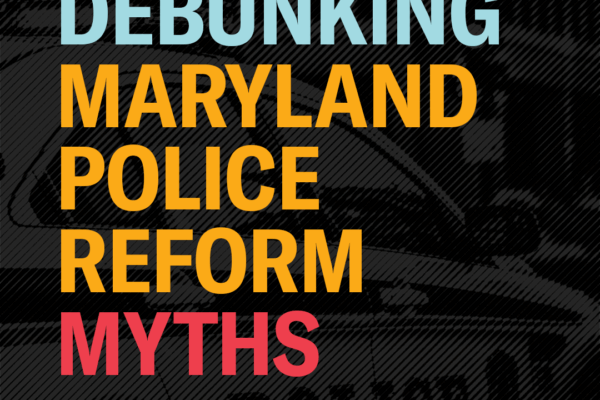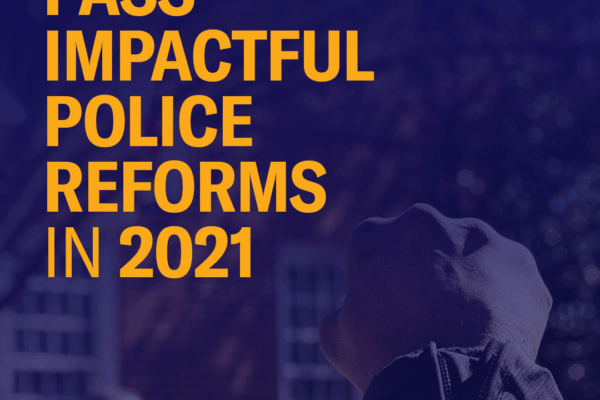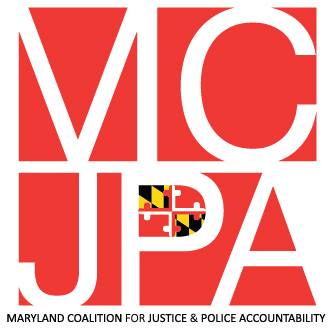More than 85 organizations in Maryland are united for a package of police reforms that must be passed by the General Assembly.
Demand #1: The Maryland Public Information Act (MPIA) must be amended so that investigations into police misconduct cases will be transparent.
MYTH: If the Maryland Public Information Act (MPIA) is changed, officers’ personal information (their address, children’s school information, etc.) will be made public.
FACT: The MPIA should be amended to treat records of police internal affairs investigations into allegations of police misconduct the same way investigations into everyone else are treated – as “investigatory records.” These records may be disclosed, and can be redacted to shield particular information that should not be made public.
It is unlikely that irrelevant personal information about an officer is in an internal affairs record. But if it is, it could and would be redacted. Similar to how information could and would be redacted from any other police record that was disclosed to the public. What will be made public is how police misconduct cases were investigated – or if they were even investigated at all. These records are not shielded from disclosure to the public in many other states, and no problems have resulted from that fact.
MYTH It will be mandatory for police departments to reveal all details about police misconduct cases.
FACT: Right now, the problem is that information about police misconduct investigations is wrongly categorized as a “personnel record.” It is a category of record that the MPIA bars from being disclosed. Even when a police chief wants to disclose the records of an investigation, to show that it was done thoroughly and fairly, they cannot. Even worse, survivors of police abuse and misconduct are denied their right to know whether their cases were investigated properly.
The shocking fact is that currently, even when there is clear evidence that an officer has committed misconduct or has been criminally convicted of misconduct, no information can be disclosed. With Demand #1, this information would be moved from the category of “never disclose” to “may disclose”. That change would give police departments the choice to reveal details about police misconduct cases.
If a department decides not to release information, they would have to show a good reason as to why disclosure would not be in the public interest. And a judge would be able to review their reasoning and assertion.
Claim: If details about a police misconduct case are revealed, the information may be misconstrued.
The real deal: The information is already misconstrued when it is hidden from or selectively leaked to the public. When the police hide information from survivors of police abuse, it only further increases the public’s distrust of the police and their account of what happened.
If the police were to reveal how their case was investigated, it allows for trust to slowly begin to build. Telling people that they shouldn’t know how misconduct allegations are investigated, because they can’t be trusted with such information, is the surest way to create mistrust and lack of faith in those investigations.
Claim: We should just trust that police investigated the misconduct case properly.
The real deal: No one should be expected to blindly trust police departments to police themselves. This is especially true given law enforcement’s long history of racism, corruption, and police brutality against Black and Brown people. Police saying 'trust us' is not good enough. If a case was properly investigated, why wouldn’t a police department want the public to know and see that the case was handled properly and investigated thoroughly?
Why is this issue important?
The police need to detect, punish, and deter police misconduct. It is a basic and crucial function of a police department. In many communities, there is significant distrust that departments actually perform these functions. Statistics show that in many large departments, only around ten percent of complaints from the public are sustained. Survivors of police abuse deserve to know if their police misconduct cases were fully investigated or not.
In order to restore community trust in the ability of departments to effectively manage their officers, departments also need to be able to show how such investigations are conducted. They need to be accountable for their work, which can only happen if transparency is restored. In a democracy, trust must be earned, not simply demanded. That’s the point of open records laws.
Demand #2: Repeal the Law Enforcement Officers’ Bill of Rights (LEOBR)
Claim: An officer’s job is difficult and stressful. They deserve special rights.
The real deal: Police officers are the only public employees who are armed and authorized by virtue of their job to arrest, use force, and kill. Because they hold so much power, they should not be given extra rights in disciplinary proceedings that do not apply to any other public employee.
But that’s exactly what LEOBR does. It says that no matter how clear the evidence, or how horrible the conduct, short of being convicted in a court of law of a felony, a police chief cannot discipline an officer. A chief can only discipline an officer if a jury of fellow officers first says that the officer has violated departmental rules. This kind of pre-discipline hearing judged by fellow officers is not the due process required by the constitution. And this special right is not given to any other public employee (other than correctional officers, who successfully lobbied for a copycat law in 2014).
No one should have a license to get away with murder without any consequences. And we should not allow officers to stay on the force who have a record of abusing and killing Black and Brown people.
MYTH: If we get rid of LEOBR, police officers won’t have any rights.
FACT: Every public employee has due process rights in the disciplinary process guaranteed to them by the constitution, because their employer is the government. If LEOBR is repealed police officers just wouldn’t receive special rights, which right now prevent them from being disciplined promptly and fairly when they commit wrongdoing. Accountability is necessary for public safety.
MYTH: LEOBR can’t be repealed, because something needs to replace it.
FACT: The fact that we need to prevent local laws that replicate LEOBR, or collective bargaining agreements that do the same thing, does not change the urgent need to repeal special rights for police officers under LEOBR. LEOBR can and should be replaced with a law that ensures that police officers will be treated like other public employees in investigations and discipline of alleged or sustained misconduct.
A new law should give officers the same due process that other public employees receive, and that is required by the Constitution. And, just as the LEOBR currently does, that new law should prevent local laws or contracts that go beyond it. The new law also should allow for Marylanders other than police officers to conduct the investigations into alleged misconduct. This is something that the LEOBR now prohibits. Finally, it should allow local jurisdictions to create external oversight boards, like civilian review boards, to perform the disciplinary function in cases of misconduct against residents.
Why does this issue matter?
Police officers with a track record for abusing and killing Black and Brown people should not continue to be on the force or get away without any consequences for their deadly actions.
The special rights in the LEOBR hinder and delay the process that should determine whether officers have committed misconduct, and that should hold them accountable for those actions. LEOBR also ensures that the only people who can investigate alleged misconduct are other police officers, and limits chiefs’ ability to impose discipline, regardless of the evidence. This is unacceptable.
Demand #3: Restore control of the Baltimore City Police Department to Baltimore City residents.
MYTH: If Baltimore City had control of their own police department, they would face more financial liability for police misconduct.
FACT: This is false. During a 2019 state legislative hearing, then Baltimore City Solicitor Andre Davis said this about restoring control of the Baltimore City Police Department to the city: “There is nothing in the law that will in any way broaden the basis on which liability might be imposed on Baltimore City.”
That is because under both state and federal law, the BPD is already treated as a local government entity for purposes of determining the extent of its liability for its officers’ misconduct. Even if it were true, there is no reason why the residents of Baltimore should have less right to recover for their injuries when the BPD violates their rights than every other person in Maryland.
MYTH: The city doesn’t need any more control over its police department.
FACT: The ability of the residents of Baltimore to control their own police department through their local elected representatives is a basic right in a democracy. The people of Baltimore should be able to determine the policies that will guide the officers who police their city, just as residents of every other jurisdiction in Maryland. But because the BPD is declared in state law to be a state agency (despite the fact that no state officials exercise any oversight or control over the department), the Baltimore City Council does not have that power.
For example, a few years ago, the City Council attempted to pass a bill that would require police officers to wear body cameras. One of the city’s chief solicitors, Elena R. DiPietro, said that because the city did not have control over its police department, the Council could not enact that policy.
Claim: This isn’t a matter of racial justice.
The real deal: Baltimore City, a majority Black jurisdiction in the state, is the only locality in Maryland without the authority to govern its own police department. The state denies the people of Baltimore the power to control their police department, which is racist and blocks successful reforms from being enacted.
This matters because…
Baltimore residents shouldn’t have to go to Annapolis to demand changes to the policies and practices of their own police department.
Demand #4: Maryland must limit the use of force by law enforcement.
Claim: Police departments already have policies that limit officers’ use of force.
The Real Deal: Many police departments do have policies on the books that limit police use of force, but they are not enforceable by the public. That’s why a state law is needed. For example, the Baltimore City Police Department’s use of force policy is good on paper. But it is very clear given the department’s long track record of abuse of Black and Brown residents that there is a big disconnect with the police putting that policy into practice, and strongly enforcing it.
Claim: This reform will criminalize an officer who just made a mistake.
The Real Deal: The state limiting police use of force, including deadly force, to situations where force is necessary, does not criminalize mistakes. It simply demands that officers not unnecessarily use force in their work. This reform is necessary to begin to change officers’ behavior.
MYTH: Limiting an officer’s use of force would prevent them from doing their jobs.
FACT: A police officer’s duty is to serve and protect. The preservation of every life, not just the lives of white people, should matter. If an officer cannot do their job without exercising unnecessary or excessive force, then they should not be an officer. We see time and again how police officers can deescalate situations that involve armed white people. Yet, too often officers do not show the same restraint and respect for human life with Black and Brown people, whether they are armed or not.
We care about limits on the use of force because…
The police have gotten away with brutality and killing far too many Black and Brown Marylanders. Police officers should preserve the lives and dignity of all the people they serve.
Demand #5: Remove law enforcement from our children’s schools
MYTH: If there were no school police, schools wouldn’t know how to handle school shootings.
FACT: Across the nation, there is no measurable data that shows police in schools decrease school-based shootings. But there is clear data that shows how the presence of school police greatly increase the number of school-based arrests for Black, Brown, Indigenous, and students with disabilities. In Maryland, Black children are three times more likely to receive a school-related arrest than white children.
Many of these arrests, which are overwhelmingly for offences like fights, disruption, and petty theft, would be better handled by school administrators and counselors. They can implement restorative justice that pairs individual responsibility with learning for the students who need that support.
MYTH: Schools would have no more access to the police.
FACT: Schools will still have access to 911. Removing school police does not prevent the school from calling law enforcement for help in true emergencies.
Claim: School resource officers aren’t all bad. Some provide students with great mentoring or counseling.
The Real Deal: No matter how good a mentor an individual officer may be, they are still a police officer. And because police, are, by definition, trained and expected to enforce the law, students in schools with police officers are five times as likely to be arrested for disorderly conduct, and twice as likely to be arrested for a fight.
Officers with the power to arrest are not who we should be looking to as counselors. If we want mental and behavioral health specialists to help students make better decisions, we should hire people who are professionally trained to perform that role. Officers are not trained to care for the mental wellbeing of developing children, but therapists and behavioral health counselors are.
MYTH: Students will never learn to trust police officers if they aren’t in their schools.
FACT: Until we begin to reform policing and gain better transparency and accountability from police departments, many people will continue to distrust the police. Their presence in schools does not change distrust. Often, school police reinforce distrust, especially with Black, Brown, Indigenous, and children with disabilities who are arrested at higher rates than white students.
This is important because…
Black, Brown, Indigenous, and children with disabilities deserve to learn in communities that foster their learning and growth, without criminalizing them.
Now is the time for impactful police reforms in Maryland.
Sign the petition to urge legislators to act on those words and pass at least five impactful police reforms during the next Maryland General Assembly Legislative session.





